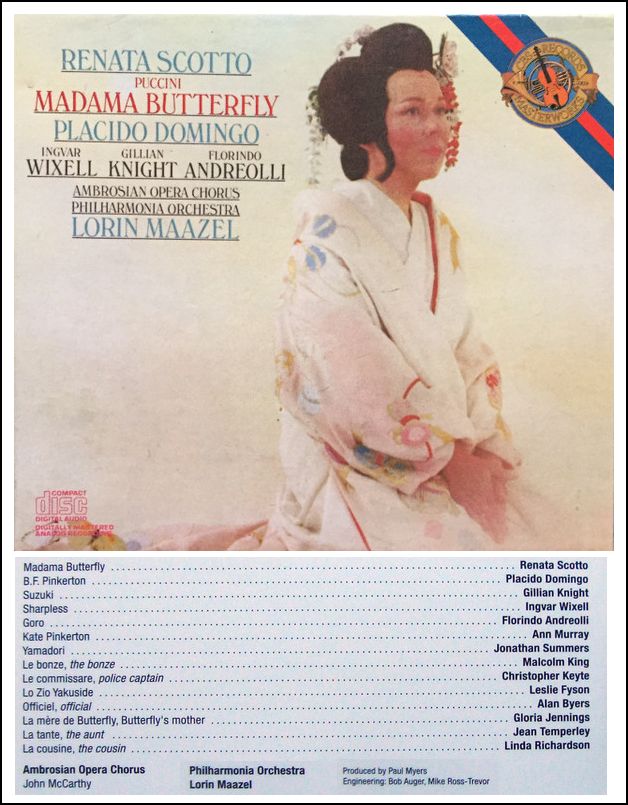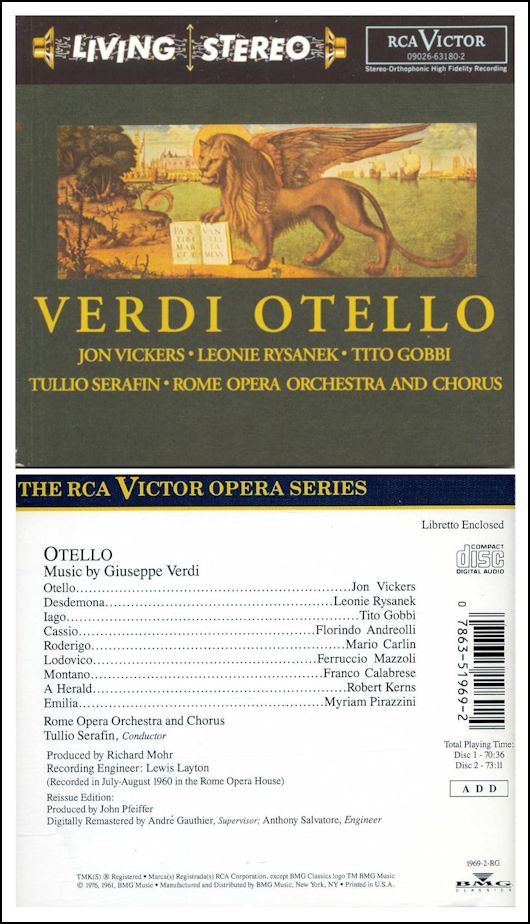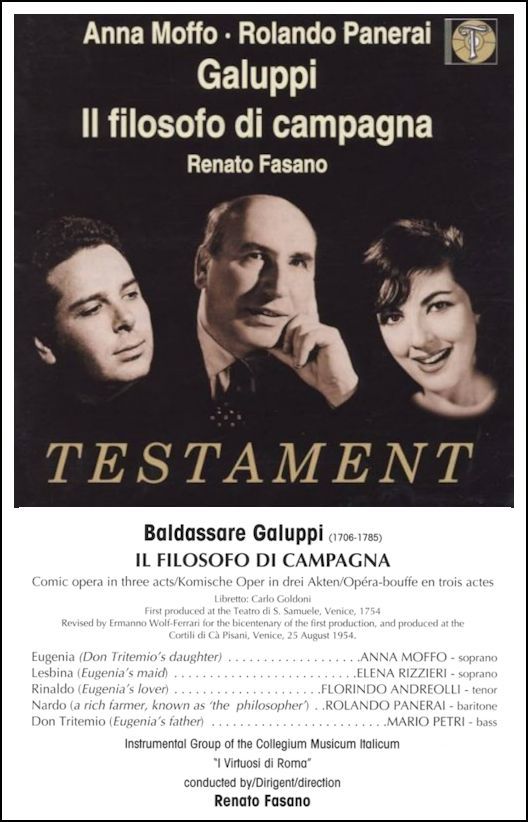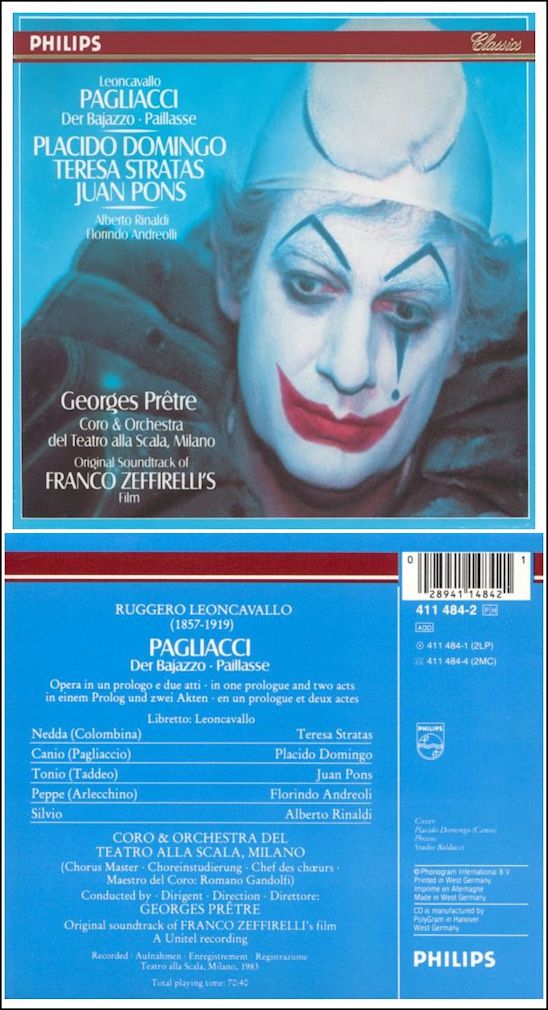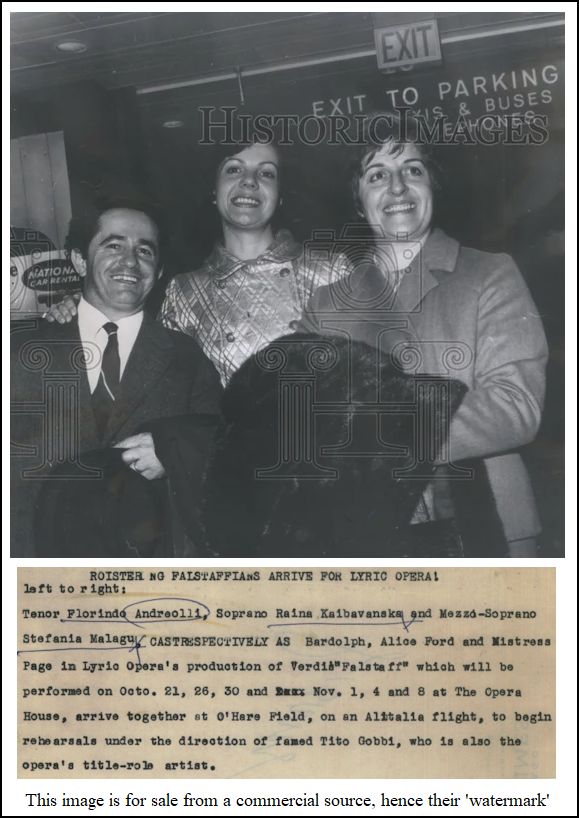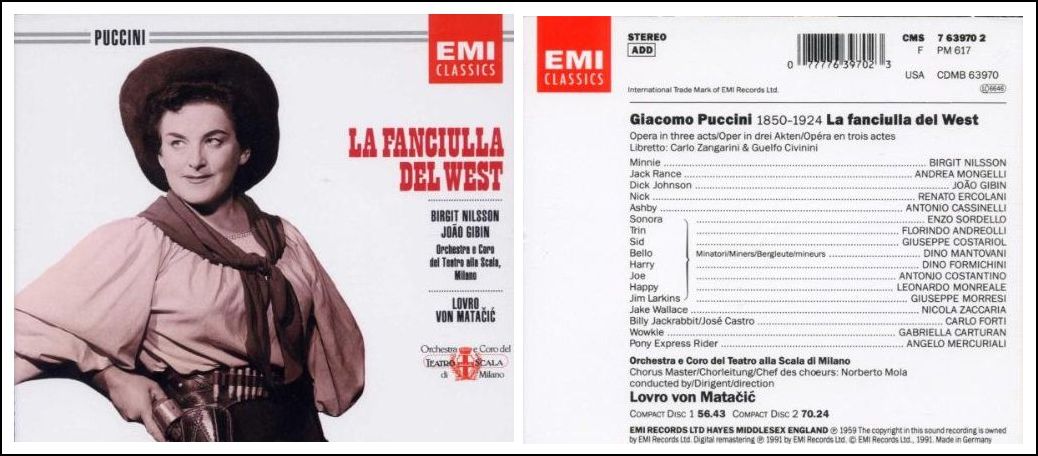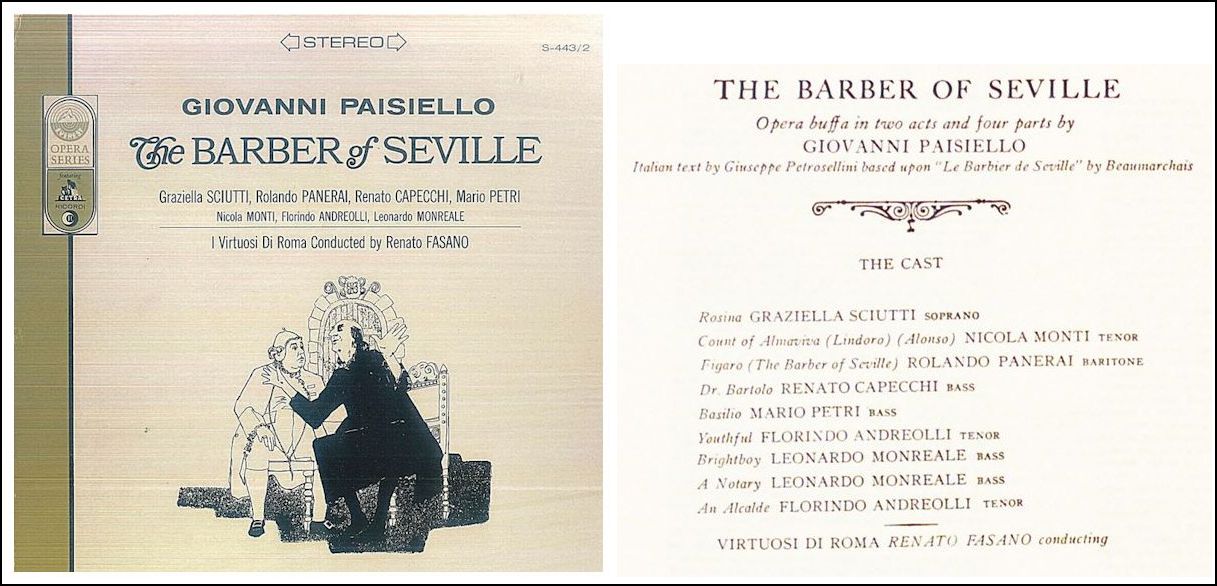1968 -
Falstaff (Bardolfo) with
Gobbi (also director), Kabaivanska, Malagù, Dominguez,
Mittelmann;
Sanzogno, Zeffirelli
Manon Lescaut (Music Master
& Lamplighter) with Maragliano, Domingo, Rinaldi;
Bartoletti,
Sequi
1969 -
Khovanshchina [Opening
Night] (Scribe) with
Ghiaurov,
Baldani,
Theyard; Bartoletti, Benois
Madama Butterfly (Goro) with
Weathers, Cioni, Rinaldi, Krebill; Quadri, Aoyama, Lee
1970 -
Der Rosenkavalier
[Opening Night] (Valzacchi) with Ludwig,
Minton,
Berry, Brooks,
Zilio;
Dohnányi, Neugebauer,
Schneider-Siemssen
Turandot (Emperor Altoum) with
Nilsson, Tagliavini,
Weathers, Washington; Votto,
Merrill, Beaton
Madama Butterfly (Goro) with
Amedeo, Tagliavini, Trimarchi, Krebill; Quadri, Aoyama, Lee
Gianni Schicchi (Gherardo)
with Gobbi (also director), Marimpietri, Garaventa, Washington; Bartoletti
1971 -
Tosca (Spoletta) with
Martin/Kubiak,
Bergonzi,
Gobbi (also director),
Tajo;
Sanzogno, Pizzi
Werther (Schmidt) with
Kraus,
Troyanos, Angot;
Fournet,
Mansouri
Barber of Seville (Sergeant)
with
Prey,
Horne, Garaventa,
Malas, Ferrin; Bartoletti,
Gobbi, Hall
Salome (First Jew) with
Silja, Cervena,
Ulfung, Nienstedt,
Little; Dohnanyi,
Lehmann, Pizzi
1973 -
Tosca (Spoletta) with
Kubiak, Tagliavini, Gobbi (also director), Tajo; Bartoletti, Pizzi
Fille du Régiment (Peasant
& Soldier) with Sutherland, Kraus, Malas,
Resnik, Tourel/Chookasian;
Bonynge, Sequi
Carmen (Rememdado) with Cortez,
King, Saccomani,
Krilovici/Wells;
López-Cobos,
Novaro, Zuffi
Der Rosenkavalier (Valzacchi)
with Ludwig/
Dernesch,
Berthold,
Sotin,
Blegen, Zilio;
Leitner, Neugebauer,
Schneider-Siemssen
1974 -
Falstaff (Bardolfo)
with Evans (also co-director), Ligabue, Zilio,
Stewart, Alva, Chookasian;
Maag, Anderson,
Zeffirelli
Madama Butterfly (Goro) with
Krilovici, Merighi,
Patrick,
Zilio;
Chailly,
Aoyama, Lee
1975 -
Marriage of Figaro
(Don Basilio) with
Dean,
Price,
Malfitano, Stewart,
Ewing;
Pritchard,
Ponnelle
1976 -
Tales of Hoffmann
[Opening Night] (Andrès & Cochenille & Pittichinaccio
& Frantz) with Donimgo/
Johns, Welting, Cortez,
Eda-Pierre,
Mittelmann, Zilio; Bartoletti, Puecher, Frigerio
Khovanshchina (Scribe) with
Ghiaurov, Cortez, Little,
Shade,
Trussel; Bartoletti,
Benois
Tosca (Spoletta) with Neblett,
Pavarotti,
MacNeil,
Tajo; López-Cobos, Gobbi, Pizzi
1977 -
Manon Lescaut (Music
Master & Lamplighter) with Chiara, Merighi, Nolen,
Montarsolo; Bartoletti/Sanzogno,
DeLullo, Pizzi
Barber of Seville (Sergeant)
with
Stilwell, Ewing,
Alva, Desderi, Montarsolo; Bellugi, Gobbi, Hall
1978 -
Fanciulla del West
(Nick) with Neblett, Cossutta, Mastromei; Bartoletti,
Prince, Lee
Madama Butterfly (Goro) with
Hayashi, Merighi/
Moldoveanu,
Romero, Zilio; Chailly, Overton, Lee
Pagliacci (Beppe) with Cossutta,
Kubiak, Manuguerra, Holloway; Chailly, Zeffirelli, Melano
1980 -
Boris Godunov [Opening
Night] (Missail) with Ghiaurov, Baldani, Sotin,
Ochman, Trussel, Petkov,
Chookasian,
Gordon,
Tyl,
Cook;
Bartoletti,
Everding,
Lee
1982 -
Tales of Hoffmann
[Opening Night] (Andrès & Cochenille & Pittichinaccio &
Frantz) with Kraus, Welting,
Zschau,
Masterson, Mittelmann,
Cook,
Negrini, Kavrakos;
Bartoletti/Schaenen, Puecher, Frigerio
Tosca (Spoletta) with
Bumbry/Marton, Luchetti/Domingo,
Wixell/
Nimsgern,
Tajo;
Rudel,
Gobbi, Pizzi
Madama Butterfly (Goro) with
Mauti-Nunziata,
Ciannella/Moldoveanu,
Bruscantini, Zilio, Cook,
Del Carlo;
Gómez-Martinez,
Prince, Dunham
1984 -
Carmen (Remendado)
wtth
Nafé/
Berganza, Domingo/Frusoni,
Devlin, Studer;
Plasson,
Ponnelle
Barber of Seville (Sergeant)
with
Raftery,
Kuhlmann/
Mentzer,
Araiza, Bruscantini, Siepi;
Bartoletti,
Sciutti,
Hall
1985-86 -
Madama Butterfly
(Goro) with
Tomowa-Sintow/Watanabe,
Dvorsky/Mauro,
Stilwell/Bruscantini, Zilio/
Graham,
Doss, Del Carlo;
Gómez-Martinez, Prince, Dunham
1987-88 -
Tosca (Spoletta)
with Scotto, Ciannella,
Milnes/Nimsgern, Tajo;
Tilson Thomas/Schaenen,
Gobbi, Pizzi
La Forza del Destino (Trabucco)
with
Dunn,
Giacomini, Nucci, Kavrakos, Graham;
Conlon, Maestrini,
Samaritani
1988-89 -
Falstaff (Bardolfo)
with Wixell, Daniels, Walker, Corbelli,
Hadley, Horne, Swenson;
Conlon, Ponelle, Calábria
1989-90 -
Tosca [Opening
Night] (Spoletta) with Marton/Neblett, Jóhannsson/Giacomini, Nimsgern,
Tajo; Bartoletti, de Tomasi, Pizzi
Der Rosenkavalier (Valzacchi)
with Tomowa-Sintow, Otter,
Moll, Battle, Patrick; Kout,
Decker, Schneider-Siemssen
1990-91 -
Fanciulla del West
(Nick) with Zschau, Domingo, Noble; Bartoletti, Prince, Lee
 Born September 24, 1925, Adria, Provincia di Rovigo, Veneto, Italy; Died
April. 18, 1995, Adria, Provincia di Rovigo, Veneto, Italy
Born September 24, 1925, Adria, Provincia di Rovigo, Veneto, Italy; Died
April. 18, 1995, Adria, Provincia di Rovigo, Veneto, Italy